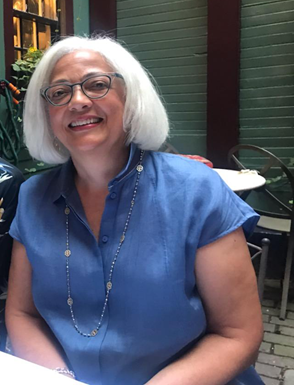Honoring Professor Renée Landers as the ABA Administrative Law Section’s Newest Senior Fellow

As noted in my introductory post, I had the privilege of inducting Professor Renée Landers into the Senior Fellow ranks of the ABA Section of Administrative Law and Regulatory Practice. This is rarefied air in administrative law, as we have only inducted twenty Senior Fellows in the Section’s storied history.
Renée Landers is a Professor of Law and the Faculty Director of the Health and Biomedical Law Concentration and the Master of Science in Law: Life Sciences Program at Suffolk University Law School in Boston. Her research focuses on administrative law and health law. She has also written on diversity in the legal profession and privacy, and she is a regular commentator on legal developments in administrative law, constitutional law, and health law.
Prior to becoming Section Chair in 2017-18, Professor Landers served in the Clinton Administration as Deputy General Counsel for the U.S. Department of Health and Human Services and as Deputy Assistant Attorney General in the Office of Policy at the U.S. Department of Justice. She also has extensive experience working in regulatory trenches of state government, including as Massachusetts Deputy Secretary of State and as Associate Commissioner of the Metropolitan District Commission (the predecessor state agency to the Massachusetts Department of Conservation and Recreation).
In the public sector, Professor Landers has served in leadership roles in so many organizations from President of the Boston Bar Association and Vice Chair of the Massachusetts Commission on Judicial Conduct, to President of the National Academy of Social Insurance Board of Directors, Board Chair of the Big Sister Association of Greater Boston, and President of the Board of Planned Parenthood League of Massachusetts. Recently, she served as Co-Chair of the Boston Bar Association’s Judicial Independence Working Group, which issued a report, entitled Judicial Independence: Promoting Justice and Maintaining Democracy, in August 2019.
These are just a few examples of Professor Landers’s commitment to government and public service. When the call to serve is extended, Professor Landers accepts—and leads with vision, distinction, and impact.
That has been the case within the Section as well. In addition to serving for six years as an Officer or Council Member, Professor Landers has twice served (once as chair) on the Section’s Nominating Committee, which identifies and recommends the new slate of Section leaders each year. As Section Chair, she orchestrated a successful transition of the ALRN leadership team, with the new leadership having become very involved in Section leadership and activities. To the great appreciation of Section Secretaries, she also streamlined and restructured the template for keeping council meeting minutes.
Her vision for the Section is nicely captured in her final Chair’s Comment published in the Summer 2017 edition of ARLN. In that column, Professor Landers called on all members of the Section and the ABA more generally “to remain involved and to encourage new voices to overcome any reticence and join the conversation.” She explained:
The Section and the ABA have traditionally convened a broad spectrum of voices representing lawyers, the concerns of the legal profession, and the clients and public whose interests lawyers are bound to protect. This role is particularly important at times when polarized views seem to erect insurmountable barriers to the ability of policymakers to achieve workable compromise in forging solutions to some of society’s most pressing problems. The Section and the ABA provide a rich environment for deliberation among lawyers and academics representing a landscape of perspectives, and are resources not to be taken for granted.
She concluded by underscoring “how important it is for our legal community to gather at meetings to discuss developments in the law, societal problems where law could form part of a solution, or law reform efforts. These engagements are not only individually rewarding, but also help sustain a legal community with some shared values. We need the participation of every voice.”
For Professor Landers, these aren’t just talking points. She lives them. In the Section, she has recruited members and leaders of diverse backgrounds and perspectives. She encourages robust debate and has gone to great lengths to make sure that every voice can be heard.
To provide just a couple of recent examples, after the killing of George Floyd, Professor Landers helped organize a symposium on the Section’s Notice and Comment blog on racism in administrative law. These essays were then featured in a signature panel at the 2020 ABA Administrative Law Conference (which Professor Landers moderated) and in the Summer 2020 issue of ALRN. And over the last year and a half, she has served on the organizing committee to help launch the ABA Program for Prospective Administrative Law Scholars. This program aims to help diversify the administrative law contingent within the legal academy by positioning promising lawyers currently in government or administrative and regulatory law practice to be successful job candidates in the academic marketplace. Her efforts to expand the breadth, depth, and diversity of the Section’s membership and leadership have made a profound, lasting impact on the Section.
In all of my interactions with Renée over the years, seeking the participation of every voice—even those with which she may disagree—nicely captures her vision as a leader. We have been so fortunate to have her leadership and service in the Section, and it is the Section’s honor to have her name added to this august group of Senior Fellows.
This essay originally appeared in the Winter 2022 issue of Administrative & Regulatory Law News, and the introductory post is available here.



